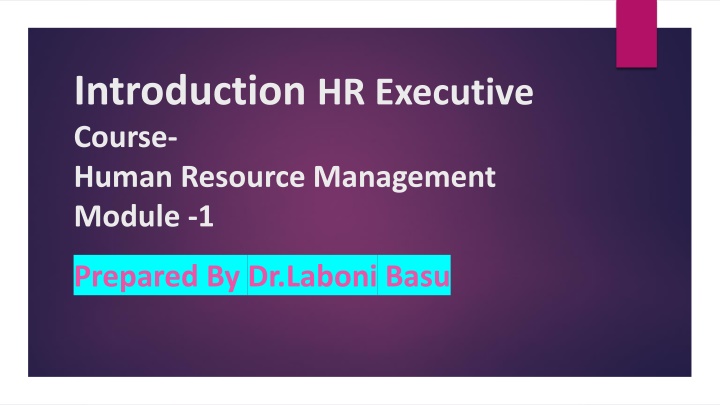
Executive HR Management Responsibilities and Duties
Gain insights into the crucial role of HR executives in payroll and employee data management, covering tasks like payroll processing, compensation administration, compliance, and data security. Explore the comprehensive scope of HR functions in organizational development and strategic planning.
Download Presentation

Please find below an Image/Link to download the presentation.
The content on the website is provided AS IS for your information and personal use only. It may not be sold, licensed, or shared on other websites without obtaining consent from the author. If you encounter any issues during the download, it is possible that the publisher has removed the file from their server.
You are allowed to download the files provided on this website for personal or commercial use, subject to the condition that they are used lawfully. All files are the property of their respective owners.
The content on the website is provided AS IS for your information and personal use only. It may not be sold, licensed, or shared on other websites without obtaining consent from the author.
E N D
Presentation Transcript
Introduction HR Executive Course- Human Resource Management Module -1 Prepared By Dr.Laboni Basu
Course Overview Scope of HRM Talent acquisition Training and development Performance management Compensation and benefits Employee relations Legal compliance Organizational development HR information systems (HRIS) Diversity and inclusion Strategic planning
Discussion Overview HR Executive Role and Responsibilities in Payroll and Employee Data Management: Payroll Management Compensation and Benefits Administration Compliance and Regulation Data Management Reporting and Analysis Employee Relations
HR Executive Responsibilities in Payroll and Employee Data Management: Payroll Management: HR executives are responsible for processing and managing employee payroll, including calculating wages, deducting taxes and other necessary withholdings, and ensuring timely and accurate payment to employees. They also handle payroll-related compliance and reporting requirements.
Compensation and Benefits Administration: HR executives play a vital role in designing, implementing, and managing employee compensation and benefits programs. This competitive pay and benefits, managing employee onboarding and offboarding, and administering incentive programs. includes conducting market research to ensure
Compliance and Regulation: HR executives must stay current with labor laws and regulations to ensure that all pay and benefits practices are compliant. This documentation of hours worked, and adhering to wage and hour laws. includes managing employee records, ensuring
Data Management: HR executives are responsible for maintaining accurate and updated employee data, including personal information, employment history, performance reviews, and disciplinary actions. They also ensure the security and confidentiality of employee data in compliance with privacy laws.
Reporting and Analysis: HR executives use employee data to generate reports and conduct analysis to support decision-making related to payroll and compensation. This may include measuring employee turnover, analyzing pay equity, and forecasting labor costs.
Employee Relations: HR executives play a role in addressing employee concerns related to payroll and compensation, including questions about pay, benefits, and deductions. They also act as a resource for employees who may need assistance with timekeeping, leave management, or other payroll-related issues.
Conclusion The HR executive plays a critical role in managing payroll and employee data, including ensuring accurate and timely payroll processing, Implementing and managing compensation and benefits programs, Maintaining employee data, and supporting decision-making through reporting and analysis. They also play a vital role in ensuring compliance with labor laws and regulations and addressing employee concerns related to payroll and compensation.
What we have studied The HR executive is responsible for ensuring accurate and timely payroll processing and compliance with related laws and regulations. - They play a crucial role in designing and managing employee compensation and benefits programs to attract, retain, and motivate employees. - HR executives are accountable for maintaining accurate employee data and ensuring data security and confidentiality in compliance with privacy laws. - They use employee data for reporting and analysis to support decision-making related to payroll, compensation, and workforce management.






















